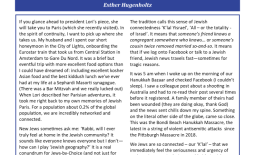The Torah’s Relationship Advice
Should we turn to the Torah for relationship advice?
Perhaps a patriarchal Bronze Age text is not quite up to our contemporary evidence-based psychological standards. Surely, there are a great many examples of rather toxic relationships and marriages in the Torah that reflect gaping power differentials, emotional abuse and a very different operating definition of what a successful relationship looks like
Perhaps the secret is not to focus on the interpersonal dynamics between human beings as an example (although there too, is a lot more growth and nuance than initially meets the eye). Instead, I propose, we look at God’s relationship with humans in the Torah as a model for intimate relationships between humans. Of course, there are plenty of aspects of God’s relationship to us, as recounted in the Torah, that are highly problematic if not downright reprehensible. But I imagine the Torah to be our ‘ethnography’ of God, just as the Torah is God’s ‘theology’ of us, and the God of the Torah continues to grow and evolve.
This idea of God’s scriptural evolution isn’t new and I am not its first proponent. Jewish educator and micrography artist Rae Antonoff, who I met a long time ago at Hebrew Union College in Jerusalem, proposes her own analysis. Rae is a woman of the times and makes incisive and entertaining TikToks (the social media app) on Jewish topics. She maps out God’s personal evolution in the Hebrew Bible in less than a minute, and here is a transcription of her TikTok:
“God grows and learns in Tanakh in ways that mirror the human stages of social and moral development… or perhaps the other way around? I wrote a paper about this for seminary. I could probably simplify this for TikTok. Genesis God is a toddler that smashes the block tower that doesn’t turn out as planned but also learns how to apologize after those outbursts and how to plan to do better in the future. Early childhood Genesis God also makes grand sweeping authentic gestures of love towards those God considers family, even if some of it gets a little intense. Exodus God is a teenager who is easily distracted but then when made aware of a big unfairness, is ready to step up and make it right even if God goes a bit overboard in punishing the unfair people. Teenage Exodus God is developing a sense of indignant protectiveness for Their chosen family and also decides its time for a road trip! Leviticus God is a young adult who thinks if They could just set up enough rules and if everyone would just actually follow them, then everything would be okay! Numbers God is getting closer to middle age and starting to realize that giving free will to these creations had some long term implications that are worth protecting but also… ‘Oy! So tiresome sometimes, these rebellious kids I’m trying to teach and protect!’ – shakes fist at Korach et al –
Deuteronomy God is getting older and has seen some stuff[1]. Doesn’t want the future generations to stray too far of course but starting to realize that trying to legislate away all human faults is an uphill battle. Better prepare the people to take on the process of regulating their own ethics…”
I find Rae’s reading not only incredibly comical in its presentation but also remarkably compelling. (As an aside, I would like to add that I am really taken by using ‘They/Them’ – the singular, non-binary/gender-fluid pronoun – for the Holy One as it instantly resolves gendering the Divine). God does evolve in the Torah and Parashat Shoftim does provide us with a ‘relationship model’ that we can derive wisdom from.
On its surface reading, Shoftim seems legislative. We are told to establish courts of justice, found cities of refuge for manslaughter, proscribe idolatry and sorcery, impose both demands and restraints on a Jewish monarch as well as provide structure for the rules of war. None of these strike us as particularly relational… or do they?
If we recast these laws in the light of God’s relationship to us as a marital metaphor, a new pattern emerges. These laws are not just laws: they are structures to have us think through, navigate and resolve, as well as sanctify, uplift and make exclusive the most intimate of human relationships: that between two spouses. While Shoftim is not exactly romantic, it fills in the details of a proverbial ketubah – wedding contract. Prosaic but protective, it makes sure that each spouse is taken care of and that mutual needs are met. Monotheism, one could argue, is spiritual monogamy, and the sacred emotional covenant between two loving partners is seen in classical Judaism as a template for our collective relationship to God; from the Song of Songs to the High Holiday liturgy. Perhaps Shoftim speaks to the need of partners to remain exclusive to each other, negotiate boundaries, resolve conflict, find outlets for (inadvertent) mistakes and treat each other with integrity and an abiding love.
There is one verse in our portion that I consider to be particularly central to this thesis:
‘Tamim yih’yeh im Adonai Eloheicha’ – ‘You must be wholehearted with your God.’ (Deut. 18:13).
Rashi comments the following about this verse: ‘hithalech imo bitmimut, utzapeh lo, v’lo tachakor achar ha’adidot’ – ‘walk before God wholeheartedly, put your hope in God and do not attempt to investigate the future’… ‘v’az tihyeh imo ul’chelko’ – ‘and so/then you shall be with God and become God’s portion.’ (Rashi quoting Sifrei Devarim 173:3). Likewise, Ramban (Nachmanides) comments: ‘sheniyached levaveinu elav levado‘ -‘we are to direct our hearts to God only.’
In turn, the Medieval commentator Chizkuni suggests: ‘The expression temimut means ‘to have an exclusive relationship with either man or God.’’
What all three interpretations have in common is the surprising shift away from legalism into emotional intimacy. Our wholeheartedness and integrity becomes the guiding principle of the Divine-human relationship, and in turn, a template for human relationships. When we enter into marriage – or another significant relationship – we cannot know what the future brings. This is why we say ‘for better or worse’, because we are obligated to live in the Present and in the Presence of love as we encounter it.
Dr. John Gottman, a famous Jewish relationship psychologist, often talks about ‘bids’. Bids are the verbal or non-verbal, physical or emotional appeals that partners bring to each other in order to deepen the intimate connection. Gottman teaches that we can respond or turn away from those bids, either investing in our partner or neglecting them.
This is what the Gottman Institute publishes on their website about bids:
“Happy couples turn towards their partners approximately 20 times more than couples in distress during everyday, non-conflict discussions. Newlyweds who were still married six years after their wedding had turned towards each other 86% of the time… Those who were divorced six years later, however, had only turned towards each other 33% of the time.
Every time you turn towards your partner’s bids for emotional connection, you are making a deposit in what Dr. John Gottman calls your Emotional Bank Account. You add value to your account when you create and build on positive moments between yourself and your partner…
Dr. John Gottman describes positive responses to bids as “turning towards” your partner: being mindful, aware, and responsive to the small interactions that the two of you have.”[2]
I think it is possible to read the entire Tanakh as God’s ‘bids’ to the Jewish people, and arguably, all humankind. In Shoftim, God ‘bids’ us – perhaps not in the most emotionally resonant way – to remain committed and to keep on investing into that so-called bank account. Dr. Gottman’s definition of a bid as a ‘turning towards’ in mindfulness awareness and responsiveness feels particularly apt during this month of Elul, as we approach the High Holiday season. Jewishly, we might call this ‘turning towards’ teshuvah. If we go with Rae Antonoff’s theory, one could argue that God’s entire relationship with humans in our Scriptures is a form of teshuvah.
Ashley and Jamie, I have come to know you both as incredibly committed people: both to each other and to the Jewish people. You truly are a ‘team’ in more than one sense of the word, and have come to enrich our Jewish life in Iowa City in so many ways. As you are preparing to stand underneath your chuppah tomorrow, it is my prayer that our tradition – including this Parashah – will continue to inspire and form you, and that you will always find your grounding in Jewish joy. Like the Torah, any marriage may have its less glamorous moments, but like the Torah also, your marriage will be built on a strong foundation. Your humor, sense of fun and gracious respect to each other will be your key to a life of happiness together. As the Hillel Director, it is easy to let your mission to serve the Jewish People be ever-present in your life, but as Devarim teaches us this week, even the soldier obligated in the milchemet mitzvah, a morally-sanctioned war, is allowed to walk away from the battlefield in order to marry his bride. Hold each other’s gaze steadily and practice teshuvah towards each other. The Rabbis teach that the month Elul codes for ‘ani ledodi v’dodi li’, ‘I am my beloved’s and my beloved is mine’. Dispensing relationship advice may not be in my official job description (together with ‘navigating a pandemic’!); but I trust you to continue finding wisdom together and in the Torat Chesed, the Torah of love, that you both share. My every blessing for you both as we celebrate with you and our community. Mazal tov!
[1] The original TikTok uses a more colloquial and slightly cruder word which I’ve chosen to amend for the purpose of a congregational sermon.
[2] https://www.gottman.com/blog/an-introduction-to-emotional-bids-and-trust/




